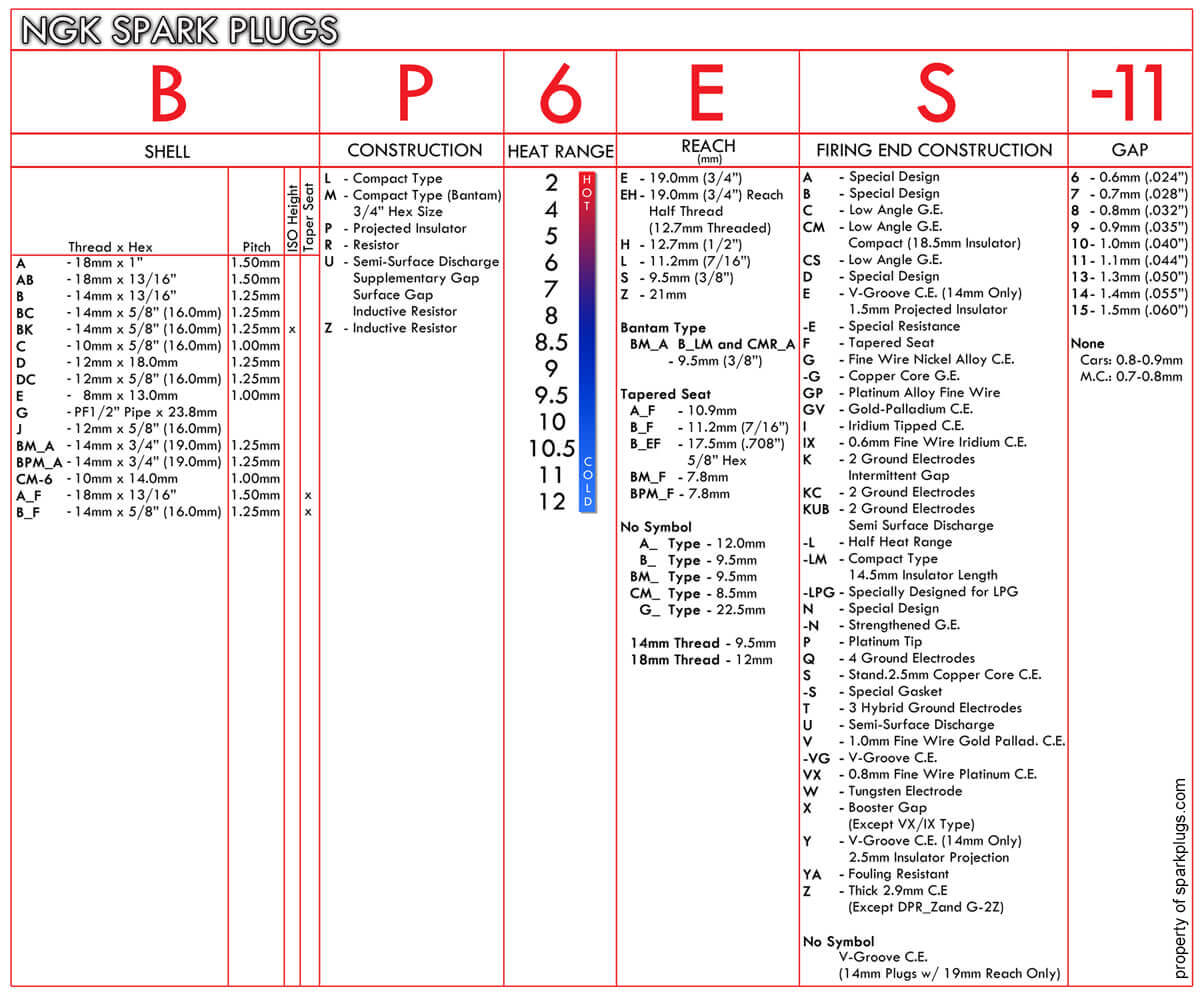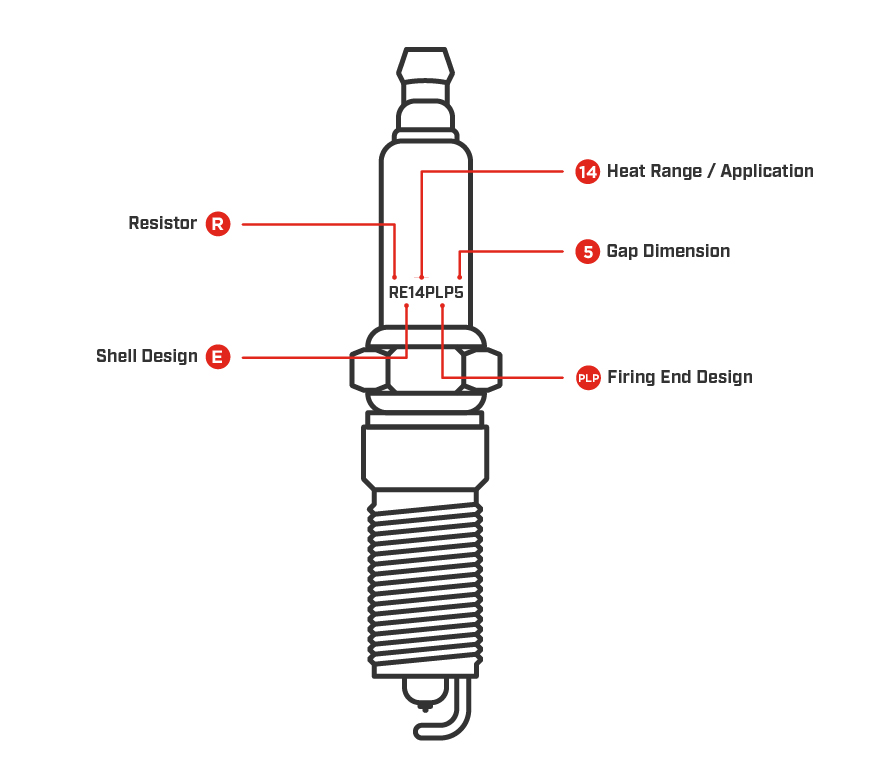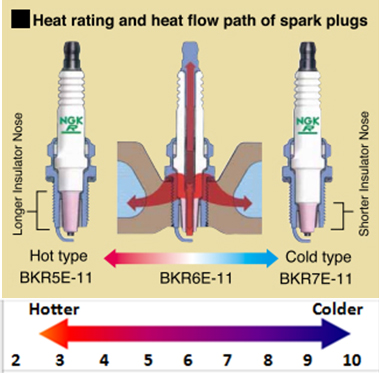Have you ever looked at a spark plug and wondered what those numbers actually mean? You’re not alone.
Whether you’re a car enthusiast or just someone trying to keep your vehicle running smoothly, understanding spark plug numbers can feel like decoding a secret language. But don’t worry—you’re about to unlock the mystery behind these numbers and discover how they affect your vehicle’s performance.
Imagine gaining the confidence to choose the right spark plugs with ease, enhancing your car’s efficiency and longevity. By the end of this article, you’ll not only understand what spark plug numbers mean but also how to use this knowledge to make informed decisions for your vehicle. Ready to get started? Let’s dive in.

Credit: www.ngk.com
Spark Plug Basics
Understanding spark plugs is crucial for anyone interested in maintaining their vehicle’s engine. They may seem small and insignificant, but they play a vital role in your car’s performance. So, what do these tiny components do, and why should you care about their numbers?
What Is A Spark Plug?
A spark plug is a device that delivers electric current from the ignition system to the combustion chamber of an engine. This ignition is what gets your engine running. Without it, your car won’t start.
Imagine having a dead battery in your phone. Just like you need power to turn on your device, your car needs that spark to ignite the fuel-air mixture. It’s a small zap, but it makes all the difference.
Why Are Spark Plug Numbers Important?
Spark plug numbers carry specific information about the plug’s characteristics. These numbers help you understand the plug’s size, heat range, and construction type. Knowing this can prevent potential engine issues.
Have you ever bought shoes online? You check the size, style, and color to ensure a perfect fit. Similarly, spark plug numbers guide you to the right match for your engine, ensuring smooth performance.
Understanding Heat Range
The heat range of a spark plug indicates how quickly it can transfer heat from the combustion chamber. A higher number means a hotter plug, while a lower number means a cooler plug. Choosing the wrong heat range can lead to engine knocking or misfires.
Think about cooking. If your pan is too hot or too cold, your food won’t cook properly. Your engine needs the right temperature balance, and the heat range helps achieve that.
Size And Thread Length
Size and thread length are also crucial elements of spark plug numbers. These ensure the plug fits securely in the engine. Mismatched sizes can cause damage or lead to inefficient combustion.
Consider trying to fit a square peg into a round hole. It just doesn’t work. The right size ensures a snug fit and optimal performance for your engine.
Material Composition
Spark plugs are made from different materials like copper, platinum, or iridium. Each material offers distinct benefits like durability or better conductivity. Choosing the right material can enhance your engine’s efficiency.
Ever noticed how some batteries last longer than others? The material makes a difference. Similarly, the right spark plug material can extend the life and performance of your engine.
Next time you consider replacing your spark plugs, pay close attention to those numbers. They hold the key to maintaining your vehicle’s health and performance. What insights have you gained about your own vehicle’s spark plugs? Share your experiences and keep the conversation rolling.

Credit: www.championautoparts.com
Importance Of Spark Plug Numbers
Spark plug numbers hold vital information for every vehicle owner. These numbers ensure your engine runs smoothly and efficiently. Understanding these numbers can prevent costly repairs and improve performance. But why exactly are they so important?
Importance Of Heat Range
The heat range of a spark plug affects engine performance. It indicates how quickly heat is removed from the spark plug tip. A proper heat range ensures the spark plug doesn’t overheat. Overheating can damage the engine. Choosing the right heat range avoids unnecessary wear and tear.
Impact On Fuel Efficiency
Correct spark plug numbers can improve fuel efficiency. They ensure optimal combustion. A properly combusted fuel mix results in better mileage. Incorrect numbers can lead to wasted fuel. This increases running costs over time.
Role In Engine Longevity
Choosing the right spark plug numbers extends engine life. It ensures consistent and reliable ignition. This reduces stress on engine components. An engine with correct spark plugs runs smoothly for longer. It minimizes unexpected breakdowns.
Influence On Emission Levels
Spark plug numbers also impact emission levels. Proper numbers ensure complete combustion of fuel. This reduces harmful emissions. Cleaner combustion contributes to a healthier environment. It also helps in passing emission tests easily.
Significance In Ignition Timing
Correct spark plug numbers affect ignition timing. Proper timing means efficient engine operation. Mistimed ignition can cause engine knock or ping. This can damage the engine over time. Proper spark plugs prevent these issues.
Heat Range Explained
Understanding the heat range of spark plugs is crucial for engine health. It tells you how well your engine can deal with heat. Spark plugs come with different heat ranges. These ranges are shown by numbers. Knowing the right heat range helps the engine perform better. It prevents damage and ensures smooth operation.
Hot Vs Cold Plugs
Hot plugs hold more heat before releasing it. They have longer insulator noses. This makes them suitable for low-speed driving. Cold plugs release heat quickly. They have shorter insulator noses. These are used for high-speed or heavy-duty driving.
Impact On Engine Performance
Choosing the right plug affects engine performance. Using the wrong heat range can cause engine knocks. It can lead to poor fuel economy. A hot plug in a high-speed engine may overheat. A cold plug in a low-speed engine may foul. It’s key to match the plug to your driving needs.
Thread Size And Reach
Spark plug numbers reveal crucial details about thread size and reach. These numbers indicate the plug’s diameter and length. Understanding these measurements helps ensure compatibility with your engine for optimal performance.
In the world of car maintenance, spark plugs might seem like small components, but they play a crucial role in engine performance. Understanding the numbers on spark plugs, especially related to thread size and reach, is essential for anyone looking to maintain or improve their vehicle’s efficiency. These numbers determine how well your spark plugs fit your engine and can significantly affect your car’s performance.Understanding Thread Size
Thread size is the diameter of the spark plug’s threaded section. It must match the engine’s spark plug hole perfectly. If the thread size is incorrect, the spark plug won’t fit securely, leading to potential engine damage. Consider the last time you tried to screw in a bolt that didn’t match the hole—it just doesn’t work, right? The same principle applies here. The correct thread size ensures a snug fit, which is vital for engine compression and performance. Spark plugs typically come in standard thread sizes, such as 10mm, 12mm, 14mm, and 18mm. Knowing your vehicle’s specifications will help you choose the right size. Always check your car’s manual or consult with a professional if you’re unsure.Significance Of Reach
Reach refers to the length of the threaded section of the spark plug. It’s the distance the plug reaches into the combustion chamber. A spark plug with the right reach ensures optimal combustion and engine efficiency. A spark plug with too short a reach may not ignite the air-fuel mixture properly, leading to poor engine performance. Conversely, a plug that’s too long could interfere with engine components, causing damage. Think of reach like the length of a pencil—too short and you can’t write comfortably, too long and it pokes through your pocket. The correct reach ensures that the spark plug functions efficiently without causing harm to the engine. To determine the right reach for your spark plugs, refer to your vehicle’s manual or consult a mechanic. Using the correct reach can improve fuel efficiency and prevent costly engine repairs. Choosing the right thread size and reach for your spark plugs isn’t just about keeping your car running—it’s about ensuring peak performance and avoiding unnecessary repairs. Have you ever checked if your spark plugs fit your engine correctly? If not, now might be the perfect time to take a closer look.Material And Design Variations
Understanding the material and design variations of spark plugs is crucial for optimizing your vehicle’s performance. Spark plug numbers aren’t just random digits; they reveal essential details about the plug’s construction and capabilities. When you choose the right material and design, you can significantly enhance engine efficiency and longevity. Let’s dive into the specifics of these variations, focusing on the differences between copper, platinum, and iridium materials and the impact of electrode design.
Copper Vs Platinum Vs Iridium
Copper spark plugs are often the go-to for budget-conscious drivers. They offer excellent conductivity, ensuring reliable starts. However, they wear out faster. My old car used copper plugs. They needed frequent replacements, but they were affordable.
Platinum plugs are a step up. They last longer than copper, making them a smart choice for those who drive frequently. They might cost more upfront, but the extended lifespan makes them a worthwhile investment.
Iridium plugs are the top tier. They boast superior durability and performance. If you want maximum efficiency and minimal maintenance, iridium is the way to go. Consider them if you’re looking to maximize your engine’s lifespan.
Electrode Design
The design of the electrode can make a big difference in your engine’s performance. Thin electrodes can enhance ignition, making your car start quicker. This design is often paired with iridium plugs for optimal efficiency.
Multi-ground electrodes are another variation. They offer additional paths for the spark, ensuring a consistent and reliable ignition. This design can be particularly useful in high-performance engines.
Have you considered how electrode design impacts fuel efficiency? A well-designed electrode can reduce fuel consumption, saving you money in the long run.
Choosing the right spark plug involves more than just picking a brand. It’s about understanding the material and design variations to match your specific needs. Next time you’re in the market for spark plugs, think about what you value more: affordability, longevity, or performance?
Decoding Spark Plug Codes
Understanding spark plug codes can feel daunting. But it’s crucial for engine performance. These codes provide vital information. They indicate size, heat range, and construction type. Knowing them helps in selecting the right plug for your engine. Let’s break down these codes and make them simple to understand.
Manufacturer Codes
Each brand uses unique codes on their spark plugs. These codes identify specific features and specifications. For example, a code might indicate the plug’s reach or thread diameter. Some codes reveal the construction material. This information helps in matching the plug to your vehicle.
Universal Standards
Some spark plug codes follow universal standards. These standards help in comparing different brands. They include details like heat range and electrode type. Heat range is crucial for engine performance. It reflects how hot or cold a plug runs. Understanding these standards ensures better engine health.
Choosing The Right Spark Plug
Understanding spark plug numbers is crucial for optimal engine performance. These numbers indicate the plug’s heat range, size, and thread type. Choosing the right plug ensures efficient combustion, minimizing engine issues and improving fuel efficiency.
Choosing the right spark plug for your vehicle isn’t just a technical task; it’s an essential part of keeping your car running smoothly. Spark plug numbers can be perplexing, but understanding them is crucial to ensuring your engine’s efficiency and longevity. Selecting the correct one can affect everything from fuel consumption to your car’s overall performance. ###Factors To Consider
When picking a spark plug, you need to keep a few factors in mind. First, check your vehicle’s manual for the recommended spark plug type. This ensures compatibility and optimal performance. Consider the heat range. A plug that’s too hot or too cold can lead to engine issues. Heat range numbers indicate how fast the plug can transfer heat to the engine’s cooling system. Material matters too. Copper, platinum, and iridium plugs each have their benefits. Copper is affordable, while platinum and iridium offer longevity and better performance. ###Common Mistakes To Avoid
One common mistake is assuming all spark plugs are the same. They might look similar, but their specifications differ significantly. Avoid using the wrong heat range. It can cause pre-ignition or fouling, leading to costly repairs. Always match the heat range to your vehicle’s needs. Don’t overlook the gap size. An incorrect gap can lead to misfires. Always verify and adjust the gap according to the manufacturer’s specifications. Ignoring signs of wear and tear is another pitfall. Regularly inspect your spark plugs. Replace them if you notice wear, carbon build-up, or other damage. Have you ever swapped a spark plug without checking these details? It’s a small oversight but can lead to big problems. So, what spark plug will you choose next time? Make an informed decision and keep your ride smooth and efficient.
Credit: www.ngkntk.in
Conclusion
Understanding spark plug numbers is crucial for car maintenance. These numbers indicate the plug’s heat range and size. Choosing the right spark plug ensures optimal engine performance. Always refer to your vehicle’s manual for guidance. This prevents engine issues and enhances fuel efficiency.
Regular checks and replacements help maintain your vehicle’s health. Simple steps lead to effective results. Keep your car running smoothly by staying informed. Remember, knowledge is power in vehicle care. Make informed decisions for a reliable ride. Your engine will thank you.
Stay proactive, not reactive, for long-term benefits. Safe driving!
